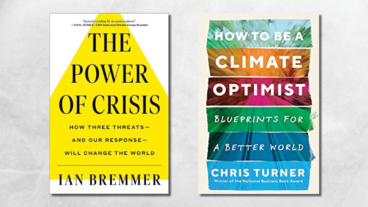Tasha Kheiriddin is a staple within Canadian politics, having spent more than two decades analyzing, reporting, and commenting on political and current affairs for major networks and publications across the nation. With her latest book, The Right Path, she presents a clear and insightful path forward for Canadians.
Currently a columnist with Postmedia, Tasha is already an accomplished writer having co-authored Rescuing Canada’s Right: Blueprint for a Conservative Revolution. With the release of her second book, The Right Path: How Conservatives Can Unite, Inspire, and Take Canada Forward, she provides a complete and thorough examination of the Conservative party in Canada — what’s gone wrong, how it got here, and how it can move forward — while providing in-depth insights into demographic and political trends in Canada.
Learn more about Tasha’s new book and how its insights can also be applied to business in the Q&A below.
Why did you write this book, and why now?
I wrote The Right Path because I care deeply about Canadian democracy, and the Conservative Party’s role in defending that. Right now, both of those things are in turmoil. The Party is going through a very divisive leadership race; there has been a lot of mudslinging and personal attacks, and one candidate has even been disqualified.
Meanwhile, many Canadians are coming out of the pandemic frustrated and angry at their politicians. Coupled with fears about the rising cost of living, this is producing a lot of social upheaval. That atmosphere is very volatile, but it can also provide an opportunity for positive change if those energies are channeled in a productive way.
What productive way could that be?
The key is to focus on opportunity. Canadians are looking for the opportunity to pursue their dreams, buy that house, start that business, and have a better life for themselves and their kids. That opportunity comes through creating a level playing field, where no one group is favoured, and which gives everyone a fair shot at achieving their goals. Government needs to facilitate equality of opportunity, not result. It needs to ensure that people get good health care and education, as well as maintain law and order to ensure that everyone operates within the same rules. It also has a role in supporting the development of major projects, which can generate jobs and opportunity, especially with a view to the needs of export markets and new technologies
What sectors could tap into this idea? How could it be harnessed by both the public and private sector?
The energy sector has a particularly good opportunity. In the book, I outline a vision of Canada as a global energy superpower, harnessing the power not just of ethical fossil fuels but critical minerals, to power the world for the next generation. It’s a vision that combines national pride with economic reconciliation for indigenous peoples and real opportunity for all workers in Canada to participate in.
You identify three voter groups that will shape the future of the country, from both a political and economic perspective. What are they and why are they important?
Those groups are New Canadians, urban and suburban families, and Millennials and Gen Z. Currently, just over one in five Canadians was born somewhere else; by 2036, that number is predicted to rise to three in ten. Most New Canadians settle in urban and suburban areas, which continue to grow.
Millennials now outnumber baby boomers, comprising 33.2% of the working age population. As for Gen Z, they are projected to outnumber baby boomers by 2032 and millennials by 2045. These groups are the future. I talk about how the Conservative party needs to appeal to them, but the same can be said of any party and any business that wants to grow.
What was the most surprising thing you learned writing this book?
The most surprising thing involved young people and their political preferences. It’s easy to stereotype Millennials and Gen Z, but they are far from monolithic. They have very different likes and dislikes not only from other generations, but from each other and from their peers.
Politically, Millennials lean mostly centre or left; only 20% describe themselves as right-wing. They have been greatly impacted by the 2008 recession and many feel that they will never attain the lifestyle or standards of their parents. Personal fulfilment is very important to them.
Gen Z’s, on the other hand, are incredibly politically polarized. Only 6% see themselves as “in the middle”, while 48% describe themselves as “on the right”. That group is very driven and success-minded, and tends to have more traditional views, while those on the left are fans of what we would describe as “social justice” and “woke” culture. The one commonality is the extent that social media shapes so many aspects of their lives, including their political views.
Above all, young people want to be listened to and understood. They are concerned about the gig economy, the environment and mental health. Young people also hunger for community, and they want to be engaged in real life as well as online.
Can lessons from The Right Path be applied outside politics? If so, how?
100%. Anyone looking to understand demographic trends in Canada, from urbanization to immigration to generational change, would gain a great deal of insight.
Populism drives many changes, not just politically but socially; when people feel frustrated, they want solutions, whether it’s buying that house they want or opening the business of their dreams. Companies who can respond to those sentiments can develop new products, including financial services or consumer goods, that appeal in this environment. Employers can better understand the desires and demands of their workforce, and how to retain and develop talent.
Plus, understanding how governments respond is also important, since none of us is an island. Politics impacts everyone, whether we like it or not. The Right Path offers analysis and insight into how parties and governments behave, which helps businesses plan their affairs accordingly.
Tasha Kheiriddin is one of Canada’s best-known commentators, analysts, and strategic thinkers. She is currently a principal with Navigator Ltd., one of Canada’s leading high stakes strategic advisory and communications firm. She customizes keynotes to her audience to provide insight and analysis pertinent to their organizations and industries.
Interested in learning more about Tasha and what she can bring to your next event? Email us at [email protected] .




